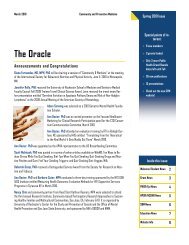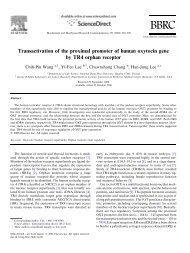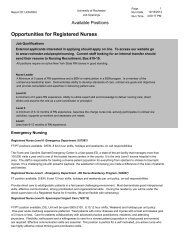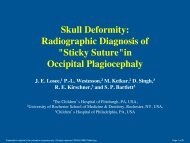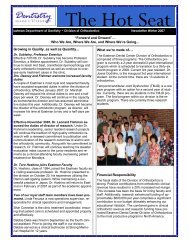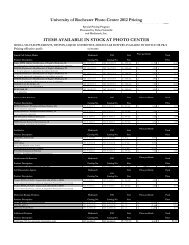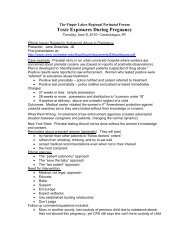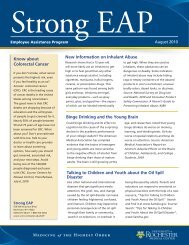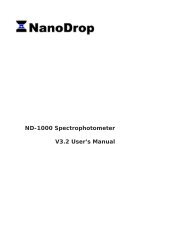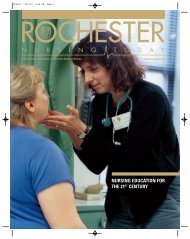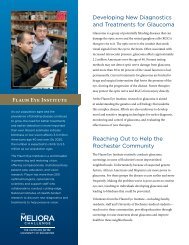Fall/Winter 2006 - University of Rochester Medical Center
Fall/Winter 2006 - University of Rochester Medical Center
Fall/Winter 2006 - University of Rochester Medical Center
Create successful ePaper yourself
Turn your PDF publications into a flip-book with our unique Google optimized e-Paper software.
to lead:<br />
School <strong>of</strong> Medicine,<br />
with largest NIH<br />
award ever, will<br />
transform research<br />
Translational Science Award (CTSA)<br />
and become part <strong>of</strong> a national consortium<br />
that will shape the emerging field<br />
<strong>of</strong> translational science. The School <strong>of</strong><br />
Medicine will receive $40 million from<br />
NIH over five years, the largest grant<br />
ever from NIH to the <strong>University</strong>.<br />
“The <strong>University</strong> <strong>of</strong> <strong>Rochester</strong> and<br />
the School <strong>of</strong> Medicine increasingly<br />
will be known as one <strong>of</strong> the places for<br />
conducting clinical and translational<br />
research and for training future investigators<br />
in this field,” said David Guzick,<br />
M.D., Ph.D., dean <strong>of</strong> the School <strong>of</strong><br />
Medicine since 2002 and principal investigator<br />
for the <strong>Rochester</strong> site <strong>of</strong> the NIH<br />
CTSA. “We share a common vision with<br />
NIH that clinical and translational<br />
science should have an academic home.”<br />
The School <strong>of</strong> Medicine has<br />
established a Clinical and Translational<br />
Science Institute (CTSI) as a new<br />
structure that will organize, enable and<br />
expand translational research. The goals<br />
<strong>of</strong> the new Institute include: increased<br />
funds for pilot projects and highlyexperimental<br />
research; enhanced services<br />
and new technology for data management,<br />
computer simulation, biostatistics,<br />
epidemiology, research ethics and<br />
community involvement; additional<br />
faculty training and a new master’s and<br />
doctoral degree programs in clinical and<br />
translational science; and formation <strong>of</strong><br />
a network <strong>of</strong> hospitals and biomedical<br />
research institutions in upstate New York<br />
whose members will collaborate on projects<br />
and share resources.<br />
“For almost a decade, <strong>University</strong><br />
leadership has been exploring ways to<br />
build on our strong foundation in clinical<br />
and translational science so as to<br />
complement its ongoing investments in<br />
basic research, and this award is a culmination<br />
<strong>of</strong> this work,” said Joel Seligman,<br />
<strong>University</strong> president. “This award places<br />
the <strong>University</strong> <strong>of</strong> <strong>Rochester</strong> in the<br />
vanguard <strong>of</strong> this emerging field in<br />
research and among an elite group <strong>of</strong><br />
universities and research institutions<br />
that will chart the course for others to<br />
follow.”<br />
As one <strong>of</strong> the first institutions<br />
chosen by NIH, the School <strong>of</strong> Medicine<br />
will influence the national approach<br />
to clinical and translational science,<br />
actively contributing to the development<br />
<strong>of</strong> research methods and infrastructure.<br />
Patient & Clinical<br />
Interactions<br />
Education & Career<br />
Development<br />
The establishment <strong>of</strong> the <strong>University</strong> <strong>of</strong><br />
<strong>Rochester</strong> CTSI— and the prominence<br />
given to institutions receiving the initial<br />
NIH awards — will make <strong>Rochester</strong> a<br />
better competitor for future research<br />
projects and for new clinical trials sponsored<br />
by government and industry.<br />
“We will be training and attracting<br />
more researchers who will conduct more<br />
grant-supported research. There will be<br />
a multiplier effect that impacts basic<br />
research, clinical practice and community<br />
outreach,” said Guzick, the CTSI director.<br />
“ In addition, translational research has the<br />
potential to generate intellectual property,<br />
licensing, start-up companies and general<br />
economic development.”<br />
<strong>Rochester</strong>’s Clinical and Translational Research Institute key five-year efforts<br />
Evaluation<br />
Upstate Network<br />
Design, Biostatistics<br />
& Ethics<br />
Regulatory Support<br />
Pilot Studies<br />
Translational<br />
Technology<br />
Biomedical<br />
Informatics<br />
Community<br />
Engagement<br />
Novel Translation<br />
Methodologies<br />
FALL / WINTER <strong>2006</strong> 5



